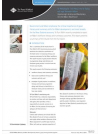Government and Māori emphasise the critical importance of good literacy and numeracy skills for Māori development, and more broadly for the New Zealand economy. Te Puni Kōkiri recently completed a report on Māori workforce literacy and numeracy outcomes.
Literacy and numeracy are critical skills for New Zealand if we are to have a productive and highly skilled workforce. Because of the Māori population’s youthful age structure, Māori will make up a greater proportion of New Zealand’s workforce in the future. Lifting literacy and numeracy attainment rates amongst working-age Māori (between 16 and 65 years) is therefore a very important objective for New Zealand’s productivity and economic growth.
Te Puni Kōkiri’s 2010 monitoring review examined the collective contribution of the State sector in improving literacy and numeracy outcomes for the Māori workforce.
CASE STUDIES
Four case studies were also chosen based on State sector agencies’ recommendations, and on the availability/accessibility of participants.
1. The Tūwharetoa Adult Literacy Initiative is coordinated by the Tūwharetoa Māori Trust Board, and is provided by Literacy Aotearoa. This programme provides literacy and numeracy support to learners in the Taupō region, in order to facilitate employment or further training. The case study summary can be read below
2. The Commercial Fishing and Processing Course is delivered by the Westport Deep Sea Fishing School, a Private Training Establishment. This 20 week programme aims to equip people with skills to gain employment in the deep-sea fishing industry. The case study summary can be read below.
3. Whakatō te Mātauranga is coordinated by the Waikaremoana Māori Trust Board. The programme adopts a multi- pronged approach to learning – integrating life skills with the academic imperatives of NCEA level 1. The programme is normally one year full-time, although learners can stay for two to three years. The case study summary can be read below.
4. TeamWorks is an on-site programme at Downer EDI Works and is delivered by an external provider, The Learning Wave. The programme comprises eight modules focusing on: leadership; communication skills; problem-solving; task planning; work roles; and team work. There are two, two day courses, with six weeks coaching and individual project work in between. The case study summary can be read below

